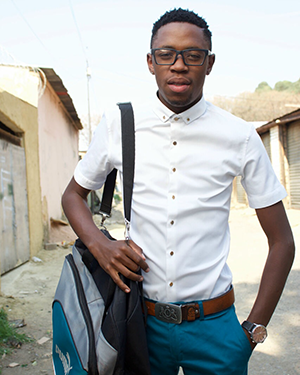News & Events
The quest for a special GBV independent police unit in SA

Khothalang Moseli is a qualified professional social worker from Aliwal North in the Eastern Cape. He holds a Bachelor of Social Work from Unisa, which he completed in 2018. During his undergraduate time at the university he was an active SASCO member at the Unisa Greater Johannesburg branch. Moseli is currently a final year Master’s student pursuing a Master of Human Rights Law at the University of the Free State (UFS). He is interested in understanding what role human rights norms and standards can play in shaping the development agenda in South Africa through the adoption of a rights-based approach to development. He wrote the newspaper article in response to the growing GBV plight in South Africa in his individual capacity.
While the global community is still struggling with the perplexing and escalating numbers of people infected and affected by the coronavirus, South African society is both battling with Covid-19, and gender-based violence (GBV) levelled against women and children. GBV is a serious concern and a prevalent problem in South Africa.
The notion of GBV can be described in many forms, depending on the context in which it is referred. However, from a holistic point of view, all the definitions share a common understanding that GBV “occurs as a result of normative role expectations and unequal power relationships between genders in society”. GBV is a severe deprivation of the enjoyment of human rights and a stumbling block for human flourishing and well-being. It has adverse effects on social and developmental aspects for survivors, as well as their families and communities.
The rights of women and children are protected in several international instruments, including the UN Universal Declaration of Human Rights (UDHR) of 1948. The preamble of the declaration stresses that people have rights by being humans. The 1979 Convention on the Elimination of all Forms of Discrimination Against Women (CEDAW) protects the rights of women, and it advocates for women’s enjoyment of adequate living conditions. Moreover, the 1989 Convention on the Rights of the Child (CRC) enshrines the rights of children such as the right to life, survival and development. On national level, women and children’s rights (such as the rights to life, dignity, privacy and others), are fully protected and guaranteed in the 1996 Constitution of South Africa. The South African government as a duty bearer must protect, promote and enforce the rights outlined in the constitution.
Although there are progressive instruments to protect and ensure the safety of women and children to give effect to the realisation of their fundamental rights, there is a growing number of women and children killed in South Africa as a consequence of GBV and fewer efforts have been made to put an end to it. It is estimated that between 25% and 40% of women and children have experienced sexual, physical, and emotional abuse in their lives. Also, it is estimated that between 12% and 28% of women and children are reported raped in South Africa. The recent shocking numbers of reported cases of abused women and children has raised fears, uncertainty, and anger towards the South African justice system. It is thus from this view that there is a dearth in response and prevention of GBV in South Africa. There is a growing need for supported, complemented GBV prevention programming and policy development. A detailed particular GBV policy framework that will give effect to the establishment of a permanent Independent Police Unit (IPU) institution is urgently needed to strengthen current effective GBV measures developed to curb the ongoing GBV plight in South Africa.
*By Khothalang Moseli | 26 June 2020
This article first appeared in the Aliwal Weekblad in Aliwal North, Eastern Cape, and is used by permission.
Publish date: 2020/07/01
